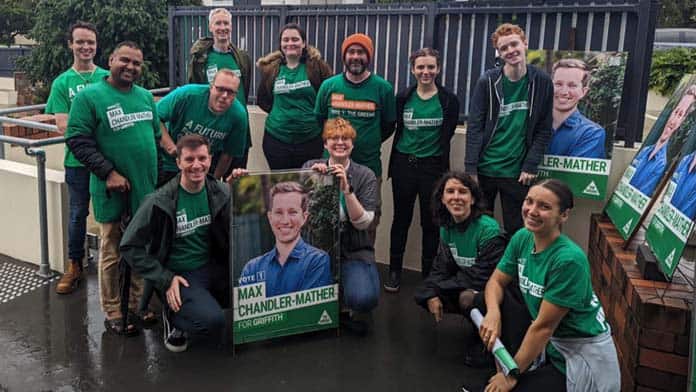The Greens celebrated their best ever result at the federal election, winning 12 per cent of the national vote and increasing their Senate seats to 12.
In Brisbane they won three new seats in the lower house, after previously holding just one, Adam Bandt’s seat of Melbourne.
This was a clear vote for stronger action on climate change. But The Greens also campaigned for free dental care and mental healthcare as part of Medicare, free university and TAFE courses as well as wiping student debt, building one million new affordable homes, and taxing big companies and the billionaires to pay for it.
Their campaign in Brisbane in particular has generated a lot of excitement. Max Chandler-Mather, who won the seat of Griffith, described it as “the biggest campaign in the history of the Australian Greens”.
But it was based on a single-minded electoralism that sees the party’s aim solely as winning more and more parliamentary seats. This is a shift away from The Greens’ origins as campaign activists in the anti-nuclear movement or the Franklin Dam campaigns of the 1980s. And it focuses activists’ energy away from building the movements we need today.
According to their Griffith campaign manager Liam Flenady, “We knocked on 90,000 doors and had almost 30,000 one-on-one conversations. That’s a conversation with about a full one-quarter of voters in the electorate”.
The Griffith campaign spent 14 months door knocking and training people to do it. The Greens have been focused on this in Brisbane for the last eight years, since they elected Jonathan Sri to the Brisbane city council, followed by two MPs to state parliament.
They also combined this with community organising and local welfare work where as Max explained, “We helped clean up after the floods, we dropped off care packages to people in lockdown, we planted community gardens, we helped fight back against unsustainable flight noise, and we fought the sell-off of public housing.”
All of these efforts were subordinated to building The Greens’ electoral support in the seat and winning votes.
But a focus on seats in parliament is not the way to win change. The campaign in Griffith argued for a fanciful, and hopelessly gradual, “18 year plan for a Greens government” over six election campaigns. We can’t afford to wait 18 years to win change—we need to be building movements on the streets and in the workplaces to fight for it.
Power in parliament?
The Greens’ hopes of winning the balance of power at the election did not eventuate.
This, they argued, was a strategy that could “get things done” in parliament and “push the next government to go further”. They hoped that the government of the day would be forced to negotiate support from The Greens and so enable them to extract concessions.
But the claim that this can deliver serious change is hollow.
In any case Labor managed to win a lower house majority in its own right. Even if Labor loses seats at the next election and is forced into minority government, there are now also seven teal independents and five other independent MPs. Labor could pick and choose which MPs to negotiate with, and could negotiate with the teals or other independents rather than The Greens.
The Greens do have a share of the balance of power in the Senate. Labor will need the support of either The Greens or the Liberals to pass legislation.
Greens Senators will often be able to block Labor bills, by voting with the Liberals. But this will not be enough to force Labor to change its policies. Labor can pursue much of its agenda without bothering with the Senate. Energy Minister Chris Bowen has already made it clear that Labor’s climate policies, for instance, can be implemented without legislation.
A focus on cutting deals in parliament is not the way to win change.
For good reasons, Greens MPs are frequent speakers at protest rallies. Their parliamentary platform could be used to build the resistance outside parliament.
The party could throw its membership and considerable resources into mobilising for demonstrations and to build the climate movement, union struggles and other campaigns.
Instead the party is already focused on the next electoral effort—including upcoming state elections in NSW and Victoria.
The Greens’ greater presence in parliament will mean that there will be more left opposition to the Labor government, particularly over climate; opposition to the Labor-supported Scarborough gas carbon bomb project is one example.
But this won’t mean much unless it fuels the struggles that can push action beyond Labor’s timid targets. We can draw hope from The Greens’ success—but the passive electoral support needs to be turned into active struggle outside parliament.
By James Supple






